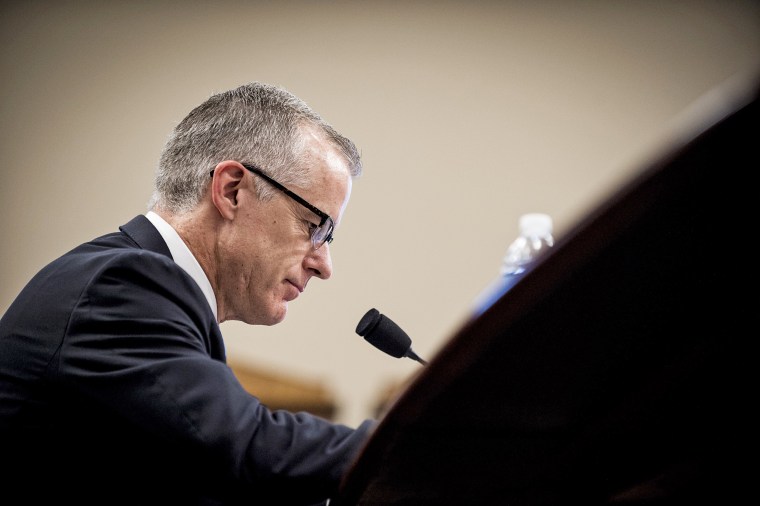Lawyers for ex-FBI Deputy Director Andrew McCabe wrote to federal prosecutors late Thursday, urging them not to keep pursuing charges amid what they say are rumors circulating in Washington that he would not be indicted.
"If the grand jury voted not to approve the charges, it did not find probable cause. Therefore, it is simply not reasonable to believe that a trial jury would find Mr. McCabe guilty of any charges," McCabe's lawyers said in an email to federal prosecutors, noting they did not know the basis for the rumors.
It had been expected Thursday that a federal grand jury would hand up an indictment on McCabe, allowing prosecutors to move forward with a trial on charges related to lying to federal agents about a disclosure he made to the media in 2016.
But when no such indictment was publicly released after the U.S. District Court for the District of Columbia closed on Thursday, many suspected the grand jury had decided not to indict him.
If prosecutors fail to convince 12 out of 23 members of a grand jury to indict, a situation known as a "no true bill," it would be a rare occurrence. A vote of no true bill is considered to be a sign that prosecutors would have a hard time getting a conviction at a trial, where the standard of proof is higher, the jury must be unanimous, and the defense can attack the government’s case.
Download the NBC News app for breaking news and politics
With no word from the Justice Department on where things stand, McCabe's lawyers cited media reports, including articles in the New York Times and the Washington Post, that speculated the grand jury had failed to indict him.
If a grand jury does not indict, prosecutors may ask to convene another grand jury. But it is also a long-standing Justice Department rule that no U.S. attorney should move forward with a case unless prosecutors have a reasonable chance of getting a conviction.
McCabe's lawyers cited that policy in their email:
"We believe that given the length of this investigation, and the resources devoted to it, this is not a case where authorizing resubmission of the case to a grand jury is consistent with this standard. If the evidence presented by your office was insufficient to convince 12 members of the grand jury to find probable cause to believe that Mr. McCabe had committed any crimes, no attorney can reasonably believe that 'the admissible evidence is sufficient to obtain a guilty verdict by an unbiased trier of fact,'" they said.
Deputy Attorney General Jeff Rosen told McCabe on Thursday that his appeal against possible criminal charges against him have been rejected, according to a person familiar with the decision.
McCabe authorized the discussion with The Wall Street Journal of the FBI's investigation into the Clinton Foundation in order to rebut a story that he was impartial in the investigation. The Wall Street Journal reporter had previously written about McCabe's wife, who took campaign donations from Hillary Clinton's close political ally Terry McAuliffe for her run in a state election in Virginia.
While McCabe had the authority to release such information to the media, a 2018 report by the Justice Department's Inspector General concluded that he did so to "advance his personal interest" and "violated" the FBI's media policy. The report also said McCabe contradicted his statements about his involvement in the disclosure to the newspaper when questioned by investigators in 2017.
The report led to McCabe's firing without a pension in March 2018 by then-Attorney General Jeff Sessions.
The investigation's critics and McCabe supporters have said he has been treated unfairly by those who wish to retaliate against him for his role in the the Justice Department's investigation into possible collusion between the Trump campaign and Russia.
McCabe sued the FBI and the Justice Department in August, claiming that his firing from the FBI was part of the Trump's "unconstitutional plan and scheme to discredit and remove DOJ and FBI employees who were deemed to be his partisan opponents because they were not politically loyal to him."


